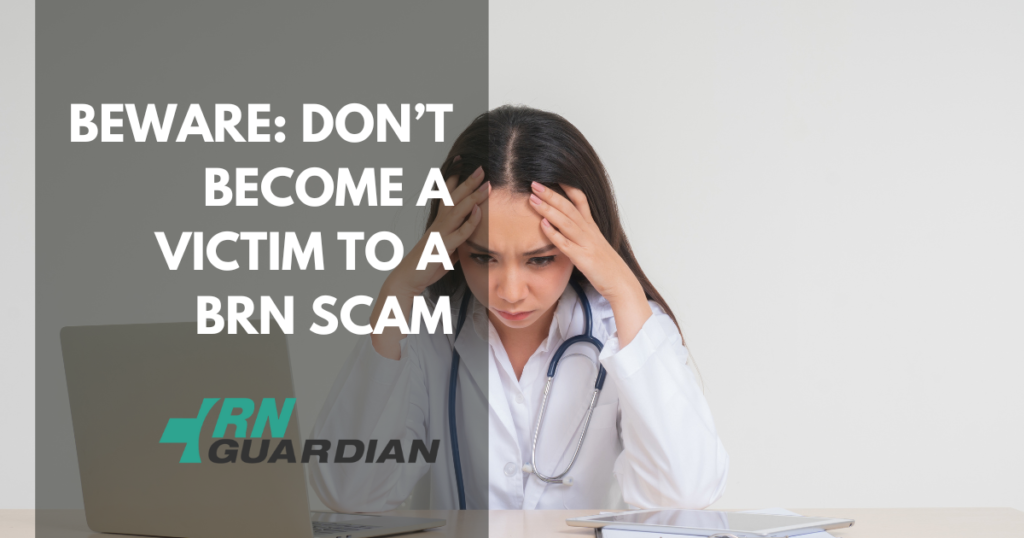It’s a scam! Here at RN Guardian, we want to ensure that you are always aware of scams and how to avoid them. We know that many nurses fall victim to these types of hoaxes every year. This is precisely why we want you to be aware of the signs so that you can protect yourself.
Scam Details
A BRN scam is when a caller pretends to be a BRN representative and asks for your personal information. It can be in the form of a fake survey, an offer to lower your payments, or even as part of a DEA agent extortion scheme. This scam aims to get your credit card information so they can empty your bank account.
Here’s how the scheme works:
- A scammer calls you and says they’re from the “BRN” (Board of Registered Nursing). They claim to be from organizations such as the DEA (U.S. Drug Enforcement Administration).
- Scammers identify themselves as agents or Board investigators telling their victims that their license is suspended for illegal drug trafficking.
- The scammers ask for the licensee’s bank account information. They associate themselves with the BRN’s office number (916) 322-3350.
No DEA agent or investigator will EVER contact RNs by telephone.
Questions to Ask A BRN Representative
If someone calls you out of the blue and claims to be with the BRN looking into your application status or requesting personal information, here are some questions you should ask them before giving out ANY information:
- Ask for their identification (name tag) and contact information so that you can verify who they are.
- Ask if they are with the BRN, including whether or not they’re on duty now. The only people who have access to the system will have an ID badge with their picture on it — if the person doesn’t have one, then something fishy may be going on!
- See if they can provide documentation proving their identity (e-mail address, name, and phone number of supervisor). Make sure there’s nothing suspicious about how quickly the “BRN” e-mailed these documents back. If someone can do that much research in ten minutes flat over an internet connection without making mistakes, then maybe something isn’t right here.
BRN’s Response to the Scams
The Board of Registered Nursing is aware of the scam and working to prevent it. This is what we know:
- BRN has not sent any e-mails or letters demanding money from its customers.
- BRN has not called anyone requesting cash from its customers.
- BRN will NEVER call you to order some money from you, no matter how often they contact you!
Ways to Avoid Becoming Victimized
As a public member, you must be aware of your surroundings and take measures to avoid becoming a victim. Here are some tips:
- Don’t give out personal information like your name, address, or phone number.
- Don’t pay for any services from suspicious people who call you out of the blue. If someone calls you about an outstanding debt, hang up immediately and report it to your local police so they can investigate it themselves.
- Be extra careful when someone asks you for money on behalf of another person or organization.
When In Doubt, Contact RN Guardian
As we can see, the scam is a serious matter. You must stay vigilant and ensure you don’t become a victim of this scam. When in doubt, ask questions! If something doesn’t seem right or someone tries to pressure you into making decisions before you are ready, stop there. Take time out and consider your options before proceeding with any BRN representative.

